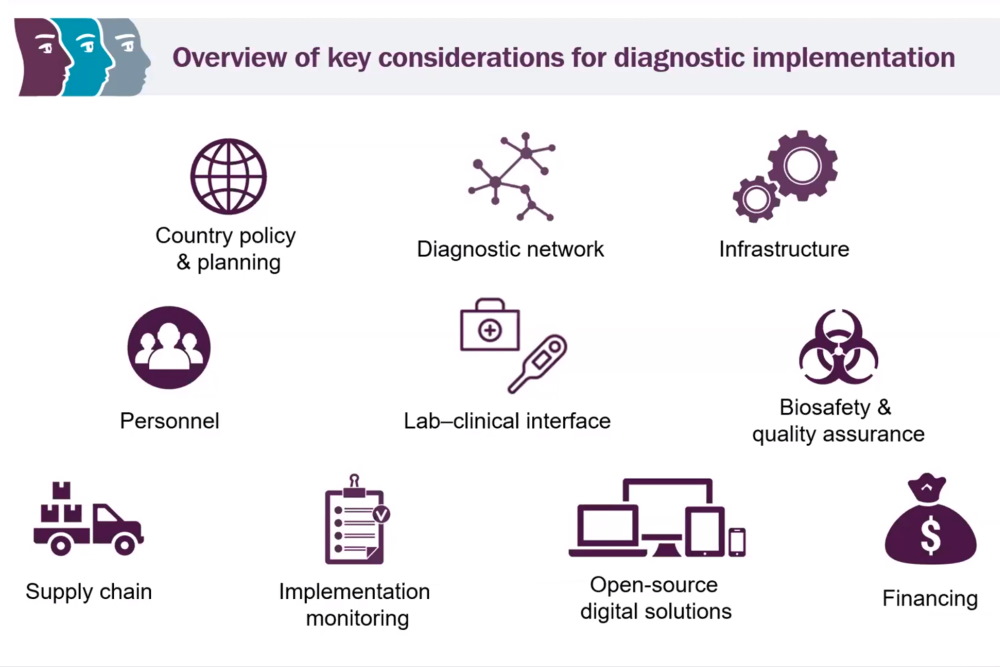On 30 March 2020, ASLM and LabCoP convened a special ECHO session on COVID-19 testing: ‘Latest update on available technology to diagnose COVID-19: recommendations for clinical care and surveillance’. This initiative was also supported by the Korea World Bank, the Africa Centres for Disease Control and Prevention (CDC) and IQVIA. Presenting to a full capacity audience of over 500 participants, Dr Cassandra Kelly-Cirino, from the Foundation for Innovative New Diagnostics (FIND), and Professor Rosanna Peeling, from the London School of Hygiene & Tropical Medicine, gave an overview of the latest technologies to diagnose COVID-19 and main use cases for diagnostics.
The presenters addressed the four scenarios in which testing is required:
- Confirming infection in patients fulfilling the COVID-19 clinical case definition
- Rapid triage of suspected cases for swift management
- Screening for infection in asymptomatic contacts of confirmed cases
- Determine exposure (current and past) to the SARS-CoV-2 virus to understand the true extent of the outbreak, map the pandemic, monitor trends and trace contacts
While molecular testing remains the gold standard for confirming cases, serology tests and other rapid assays are anticipated to play an increasing role in addressing the growing need for decentralized testing in the context of basic laboratory capacity and as the pandemic expands. A summary including details, use cases and gaps in current knowledge for a shortlist of the most promising tests can be found here.
Dr Kelly-Cirino revealed that out of about 17 shortlisted, antigen-detection, rapid serology test kits for COVID-19, five are currently being evaluated by FIND to independently verify their sensitivity and specificity and inform upcoming international guidelines.
Recognizing critical knowledge gaps that compromise the reliable interpretation of serology test results, Prof Peeling presented the current status of ongoing discussions at Africa CDC, regarding the potential utility of serology assays for rapid response and as a supplement to molecular assays. Potential uses include:
- During early outbreaks for contact tracing, for diagnosing anyone with a fever or acute respiratory symptoms or who has been in an area of COVID-19 transmission and for symptomatic contacts of confirmed COVID-19 cases
- In the context of both early outbreak and established transmission: to test all cases of severe acute respiratory infection (SARI) and influenza-like illnesses (ILI) reported through the Influenza Sentinel Surveillance System to identify undetected transmission areas
- In the context of established transmission, to diagnose SARIs presenting at hospitals
Follow the Africa CDC COVID-19 page for the latest update on these testing strategies.
Further elaborating on the additional use cases for the serology assays (such as identifying at-risk populations for public health measures), Prof Peeling called upon governments and technical agencies to share any data on test performance that might be available to support decision making on testing strategies.
The presenters emphasized that initial specimen processing requires a biosafety level-2 environment to proceed to inactivation. Information on available external quality assessment schemes was provided, with recommendations for laboratories to subscribe to these programmes in the relevant regions: Quality Control for Molecular Diagnostics (QCMD), INSTAND, World Health Organization (WHO) Health Emergencies and Global Influenza Programme, and ECDC/EVD-LabNet/ERLI-Net. Additionally, quality control materials are also commercially available from various manufacturers.
The discussion following the presentations underscored issues around the supply chain, the need to keep up with demand, and to ensure that all countries will have access to the necessary diagnostic tools. While the usefulness of the WHO initiative to establish a donation programme for manufacturers was acknowledged, further advocacy from agencies like Africa CDC and ASLM was called upon to ensure equitable access to COVID-19 diagnostic products.
You can access the latest COVID-19 outbreak updates from WHO, Africa CDC and the United States CDC on ASLM’s Outbreak Coverage web page.

